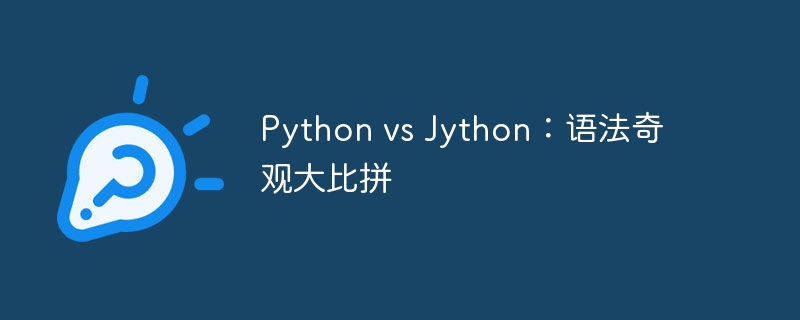Python vs Jython: A battle of syntactic wonders

Syntactic similarity
python and Jython both draw on the syntax rules of the Python language, including:
- Indentation represents code blocks: Both code blocks are represented by indentation, not braces.
- Dynamic type system: Variables do not need to be declared or specified, and the type is determined implicitly at runtime.
- Support object-oriented programming: Provides object-oriented functions such as classes, objects, inheritance and polymorphism.
Syntactic differences
Despite similar syntax, there are some key differences between Python and Jython:
- Platform integration: Jython is a Java implementation of Python, integrated with the JavaVirtual Machine(JVM). This integration allows Jython to access Java libraries and classes that Python cannot.
- Feature inheritance: Jython inherits Java features, such as Multi-threading, exception handling and memory management, while Python does not have these features.
- String type: Python supports UnicodeString, while Jython supports Java strings, which is a difference when dealing with internationalized text.
- Syntax Parity: Jython has some Java-related syntax parity, such as special handling of exception handling, which is not available in Python.
Syntax expansion
As a Java implementation of Python, Jython also provides additional syntax extensions, including:
- Java Interoperability: Jython allows easy calling of Java classes and methods without writing Java code.
- Type annotations: Jython supports type annotations, which helps static code analysis and improves code readability.
- Annotations: Jython supports annotations, which are used to provide metadata or document information to enhance the understandability of the code.
Applicable scene
Python and Jython have different applicability in different scenarios:
- Python: Suitable for a variety of applications, including web development, data science, automation, and scripting.
- Jython: Suitable for applications that require integration with the Java platform, such as application extensions, server side development and automation.
Summarize
Python and Jython share a similar syntax foundation, while each has its own unique features. Jython's integration with the JVM and Java interoperability make it ideal for scenarios that require interaction with the Java platform. Python, on the other hand, serves as a general-purpose language suitable for a wide range of applications and offers wider libraries and community support. Ultimately, the best language choice depends on the needs of your specific application.
The above is the detailed content of Python vs Jython: A battle of syntactic wonders. For more information, please follow other related articles on the PHP Chinese website!

Hot AI Tools

Undresser.AI Undress
AI-powered app for creating realistic nude photos

AI Clothes Remover
Online AI tool for removing clothes from photos.

Undress AI Tool
Undress images for free

Clothoff.io
AI clothes remover

AI Hentai Generator
Generate AI Hentai for free.

Hot Article

Hot Tools

Notepad++7.3.1
Easy-to-use and free code editor

SublimeText3 Chinese version
Chinese version, very easy to use

Zend Studio 13.0.1
Powerful PHP integrated development environment

Dreamweaver CS6
Visual web development tools

SublimeText3 Mac version
God-level code editing software (SublimeText3)

Hot Topics
 1381
1381
 52
52
 How to solve the permissions problem encountered when viewing Python version in Linux terminal?
Apr 01, 2025 pm 05:09 PM
How to solve the permissions problem encountered when viewing Python version in Linux terminal?
Apr 01, 2025 pm 05:09 PM
Solution to permission issues when viewing Python version in Linux terminal When you try to view Python version in Linux terminal, enter python...
 How to efficiently copy the entire column of one DataFrame into another DataFrame with different structures in Python?
Apr 01, 2025 pm 11:15 PM
How to efficiently copy the entire column of one DataFrame into another DataFrame with different structures in Python?
Apr 01, 2025 pm 11:15 PM
When using Python's pandas library, how to copy whole columns between two DataFrames with different structures is a common problem. Suppose we have two Dats...
 How to teach computer novice programming basics in project and problem-driven methods within 10 hours?
Apr 02, 2025 am 07:18 AM
How to teach computer novice programming basics in project and problem-driven methods within 10 hours?
Apr 02, 2025 am 07:18 AM
How to teach computer novice programming basics within 10 hours? If you only have 10 hours to teach computer novice some programming knowledge, what would you choose to teach...
 How to avoid being detected by the browser when using Fiddler Everywhere for man-in-the-middle reading?
Apr 02, 2025 am 07:15 AM
How to avoid being detected by the browser when using Fiddler Everywhere for man-in-the-middle reading?
Apr 02, 2025 am 07:15 AM
How to avoid being detected when using FiddlerEverywhere for man-in-the-middle readings When you use FiddlerEverywhere...
 What are regular expressions?
Mar 20, 2025 pm 06:25 PM
What are regular expressions?
Mar 20, 2025 pm 06:25 PM
Regular expressions are powerful tools for pattern matching and text manipulation in programming, enhancing efficiency in text processing across various applications.
 How does Uvicorn continuously listen for HTTP requests without serving_forever()?
Apr 01, 2025 pm 10:51 PM
How does Uvicorn continuously listen for HTTP requests without serving_forever()?
Apr 01, 2025 pm 10:51 PM
How does Uvicorn continuously listen for HTTP requests? Uvicorn is a lightweight web server based on ASGI. One of its core functions is to listen for HTTP requests and proceed...
 What are some popular Python libraries and their uses?
Mar 21, 2025 pm 06:46 PM
What are some popular Python libraries and their uses?
Mar 21, 2025 pm 06:46 PM
The article discusses popular Python libraries like NumPy, Pandas, Matplotlib, Scikit-learn, TensorFlow, Django, Flask, and Requests, detailing their uses in scientific computing, data analysis, visualization, machine learning, web development, and H
 How to dynamically create an object through a string and call its methods in Python?
Apr 01, 2025 pm 11:18 PM
How to dynamically create an object through a string and call its methods in Python?
Apr 01, 2025 pm 11:18 PM
In Python, how to dynamically create an object through a string and call its methods? This is a common programming requirement, especially if it needs to be configured or run...




